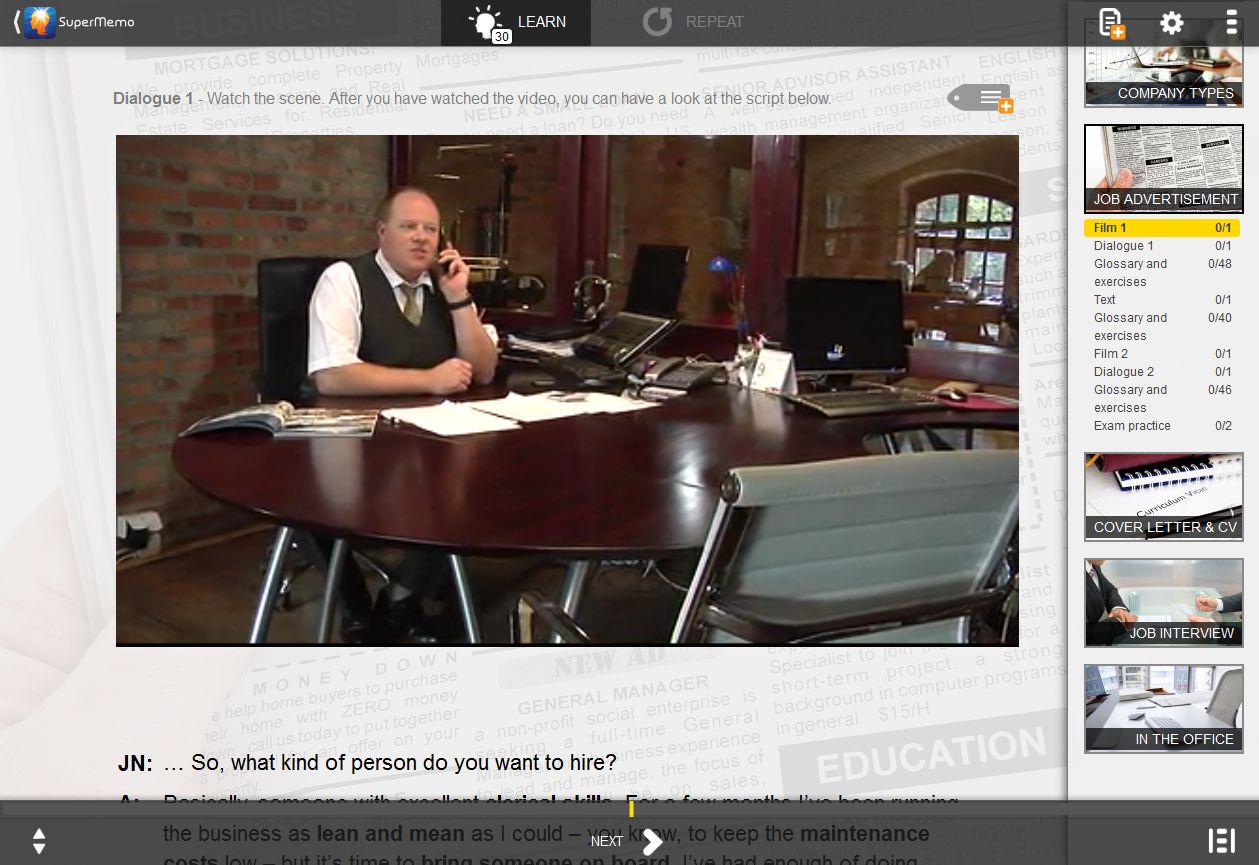English CV – essential components
Let’s start with the fact that your CV, whether in English or Polish, is not a cover letter. It should be neat and concise. How much should space such a document take? Try to keep it to 1-2 pages. What should they contain?
Contact details
First, your future employer needs to know who to contact if the CV seems interesting to them. Therefore, your English CV should contain detailed contact information (it is always worth checking what data the employer requires):
- first and last names
- phone number
- e-mail address.
If you use LinkedIn, you can also add links to your profile.
Professional profile
What definitely distinguishes a CV in English is the short paragraph (usually 4-6 sentences) in which you can list your key skills. Briefly describe your career goals and explain why you are applying for this particular position and what your expectations are for the new job. In an English CV, the professional profile is extremely important, in fact, it often decides whether the recruiter will proceed to the next part of the document or reject your application at the initial stage.
When writing a job profile, use the information contained in the job advertisement. Adjust your expectations to what your future employer requires of you. If your vision of working in a given position is very different from the perception of a potential employer, it may be worth considering whether to let go and try your hand elsewhere.
Education
Regardless of whether you are writing your CV in English or Polish, it must contain information about your education. Start with the most recent educational achievements and list the schools or colleges you completed earlier in your life in the following paragraphs. Here, you can also include any specialised training that will increase your value in the eyes of the recruiter/future employer in your CV.
Professional experience
An indispensable element of any CV – in English and in any other language, is to provide your work experience, preferably in the form of a list. Start with your last job and list your previous jobs in the following sections. Include your job title, responsibilities, and special professional achievements in the list. Also, be sure to include specific time frames.
Importantly, if you apply for, say, a job as a marketing specialist, it is not necessary to include in your CV information about your summer jobs. Focus on positions that will confirm that you have the competencies vital for this position.
Additional skills and interests
In this section, list any additional skills that will help you in carrying out your duties in your future job. Now is a good time to list the languages you know, to mention that you have a driving licence or any specific certificates you have.
Also, briefly describe your interests and hobbies. Make sure that they are related in some way to the position you are applying for. Look at them through the prism of the your future employer’s expectations. Avoid broad terms like movies, travelling, sports, but go into detail. If your interest in cinema is related to your future job, write what kind of cinema interests you and why this hobby is important in the context of your work.
What not to include in your English CV
Are you applying to work in England or the United States? When writing your CV in English, remember not to add your photo to it. It is essential, as it protects the employer against possible allegations of discrimination. For this reason, in your English CV, do not include data such as:
- sex
- date and place of birth
- marital status.
Of course, it is worth studying the job advertisement carefully, as the specificity of various professions may require other information to be provided. However, the generally accepted good practice when writing a CV in English is to avoid including the above information in the document.
What language should I use when writing my CV in English?
The language in an English CV must be fit for purpose. It should easily convey to the recruiter that you are the right person for the position. To introduce yourself in a concise and precise way:
- Avoid typing in passive mode (instead of writing: “I was responsible for”, try to be specific: “I managed a team of 30 employees”).
- Avoid pronouns.
- Avoid unnecessary adjectives and flowery language.Ideally, numbers and facts should speak for you on your CV. Move away from a descriptive, flowery style for something more specific.
Useful words and phrases in your English CV
How do you write a CV in English to impress your potential employer? Below are some words and phrases that are worth using.
Highly experienced
This expression means a person with great experience. It can be used in connection with a specific skill, such as “highly experienced in team management” or in relation to a specific position, such as a “highly experienced manager”.
Excellent communication skills/a good communicator
Use this phrase when you want to describe yourself as a person with exceptional communication skills. This wording is worth reaching for, especially when the job you are applying for is highly team-based and requires contact with many people.
Self-starter
This term means a person who can take the initiative. However, as mentioned before, it’s better to avoid simply describing yourself by using adjectives. Instead of adding more, it’s a good idea to use words that relate directly to your achievements. Words such as, for example:
Created
It relates to what you have managed to create. This is the verb “create” in the past tense. How do you use it in your English CV? For example: “Created blog posts, landing pages and daily content for clients’ social media profiles.”
Organised
This is the verb “organise” in the past tense – in the American spelling “organized”. How can it be applied in practice to describe your previous professional achievements? For example, as in this sentence: “Organised/Organized the company’s annual international summit.”
Formulated
This is the form of the past tense of the verb “formulate”. Example in use: “Formulated company-wide work from home policy.”
Generated
Did your activities in the company lead to the generation of numerous accounts set up by new customers? Use the verb “generate” in the past tense, framing a sentence like this: “Generated the opening of 250 new customer bank accounts.”
When looking for help with writing a CV in English and wanting to expand your business vocabulary, it is definitely worth reaching for the Business English series from SuperMemo. The courses are divided into various subject areas which will facilitate precise training in the area of your choice.
English CV – which phrases should you avoid?
How do you write a CV in English, so as not to scare a recruiter away? Remember a few cliched, threadbare words that could be a huge red flag to them.
When writing an English CV, beware of words such as:
Hard-worker
This is often just an empty word. It’s better to give some facts that will support this claim. Instead of writing that you can work hard, write down what you achieved with that hard work. The recruiter should draw the appropriate conclusions when looking at your well-written English CV.
Passionate
A cliche that has long lost its power. If you are not passionate about your duties, you are unlikely to apply for a given position. Try to distinguish yourself from hundreds or thousands of “passionate” candidates. Write why work is your passion, what it gives you, and in what areas it allows you to fulfil yourself.
Team-player
If you absolutely want to define yourself in this not very original way, mention a story of success that you managed to achieve thanks to teamwork.
4 universal tips
It does not matter in which language you write, whether it is a CV in English, Spanish or German. When creating your Curriculum Vitae, remember to:
- Be concise, but don’t cut corners – it’s best if you don’t exceed one page. However, if you find it difficult to fit all the information on just one page, the absolute maximum is a CV of two A4 pages. If your CV is longer, check if something could be better edited. Maybe you can skip some less important points? However, remember not to omit key skills for a given job.
- Avoid gaps – if possible, try to maintain continuity in your professional experience. Employers are suspicious of longer breaks between successive jobs. If you’ve taken a year off to travel around the world, include it in your CV. Present it as a benefit, briefly write how this year of experiences has developed you, why you have become a better worker thanks to your travels.
- Don’t embellish reality – in the era of social media and universal Internet access, a recruiter is able to quickly verify whether your CV contains true information. The lie will always come out, be it at the recruitment stage or during the performance of your professional duties.
- Refine the layout – what your CV looks like in English or another language is very important. It must be arranged in such a way that the recruiter can easily navigate through all the information and that the most important bits reach them first, to present you in the most favourable light.
Now that you have read our tips on how to write a CV in English, it’s time to start conquering the international job market. When looking for a future employer, remember to target companies where you will have contact with foreign languages. Choose a career path that will allow you to develop yourself. Nowadays, languages are a must-have, so it’s worth dealing with them as often as possible.



